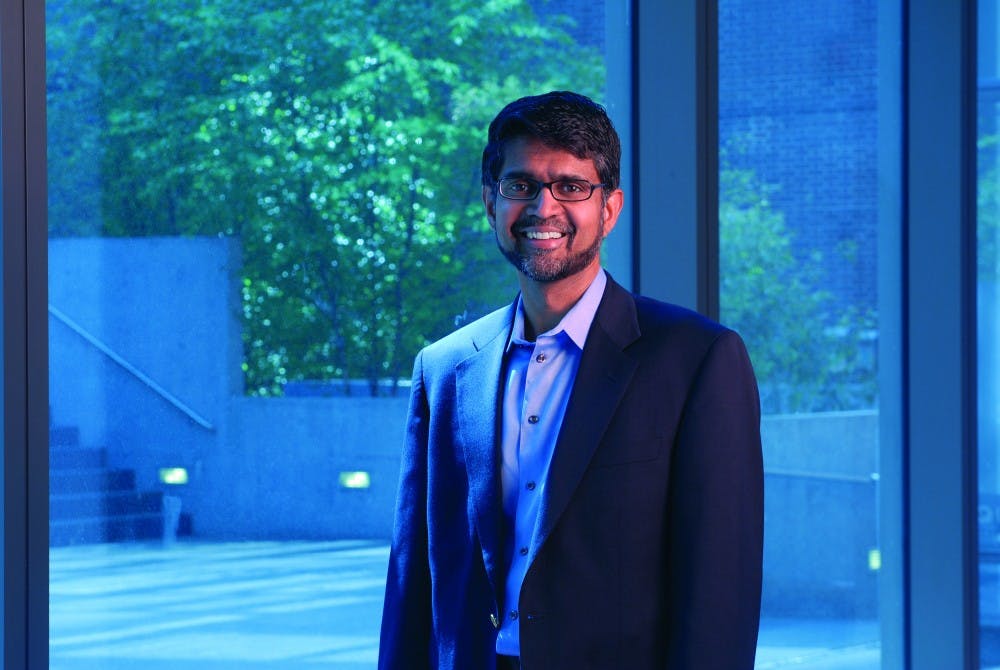
Newly appointed Penn Engineering Dean Vijay Kumar has written over 400 referenced articles and papers, published more than 20 books and book chapters, and even built his own hoverboard. | Courtesy of Penn Engineering
While some faculty members teach students how the world is, Engineering Dean Vijay Kumar, who took the helm over the summer, wants to teach his students about the world they can create.
Before becoming an engineering rockstar, Kumar was simply a teenager with a passion for science fiction.
“‘Any technology that’s sufficiently advanced is indistinguishable from magic," Kumar said, quoting famous science fiction author Arthur C. Clarke. "If you want to study magic, if you want to create the world that has not been, you want to know engineering. That’s what drew me to engineering."
Drawing on this inspiration, Kumar even built his own hoverboard.
“The fundamental thing about engineering is being able to create, to synthesize, to build — and especially build and create things that have never been built before. No other field quite does that,” Kumar said.
After completing his bachelor’s degree at the Indian Institute of Technology, Kumar, who originally hails from India, was inspired to study in the United States by one of his mentors who had studied here. He fondly remembers his mentor telling him that it wasn’t just about the academic opportunities, but also the culture that he would experience in the U.S. that would change him forever.
“When you come here there’s this feeling that … if you work hard you can accomplish anything you set out to,” Kumar said.
A trailblazer in the field, he has written over 400 referenced articles and papers and more than 20 books and book chapters, is a member of various prestigious national and global engineering associations and has received countless awards and honors for not only his research but also his teaching skills and dedication to students. He has mentored various doctoral students who are now pioneers in the field themselves.
Kumar's resume includes a plethora of positions at Penn. After completing his doctorate in Mechanical Engineering in 1987 at The Ohio State University, he joined the School of Engineering and Applied Science faculty as a professor. Among his many appointments, he served as UPS Foundation Professor of Transportation with appointments in three engineering departments and as deputy dean for Education in the Engineering School from 2000 to 2004, helping to add several innovative master’s degree programs to the school's offerings.
But even with his packed schedule, Kumar still finds time for the lab. He works out of the General Robotics, Automation, Sensing and Perception — or GRASP — Laboratory, a multidisciplinary robotics and perception lab of which he was previously director. From 2012 to 2014 he even took a brief leave to work in the White House as assistant director for Robotics and Cyber Physical Systems in the Office of Science and Technology Policy.
“Vijay has this phenomenal experience, expertise and drive to make Penn Engineering a leader in innovation … [He] is somebody that techies have to not only love but admire — and particularly Penn techies because he has been for me one of the great faculty leaders in helping me build the Pennovation Center,” Penn President Amy Gutmann said, adding that some of Kumar's research will be featured in the newly renovated building.
One of Kumar’s most fundamental contributions to the engineering field — his first introduction to the field, in fact — stems from work in robotics. He was one of the first to explore the idea of multi-robot formation control. Instead of building general purpose machines that can do everything, which can become tedious and very difficult, Kumar's research proposed building multiple machines that can do simple tasks and be configured together like Legos to accomplish a broader function. Then, the challenge becomes making the machines better communicate with each other.
“Imagine your thumb being controlled by one computer and your forefinger being controlled by another computer and they’re doing their own thing and they have to coordinate in order for you to pick up the pen and write,” Kumar said of the process.
Although Kumar loves his research, his favorite things about Penn are teaching and seeing his students succeed.
“We get outstanding students. When they come here they’re like uncut gems, and you just have to do a little bit of polish, a little bit of honing and watch them,” Kumar said. “I’ve always been fascinated by how, with minimal structure, if you let students grow, they end up being outstanding contributors and the best part of it is that you get to take credit for it.”
Kumar takes pride in the fact that Penn provides both professors and students the opportunity to use their knowledge not only in classrooms or labs, but also for social impact in the outside world, a perspective absent from many engineering schools around the world.
"It’s true that Ben Franklin founded the University, but I think of Benjamin Franklin as the world’s first engineer, or at least America’s first engineer because he really did think about engineering in its broad context of inventing things for the betterment of society," Kumar said. "So to me this is an opportunity for doing exactly that.”
The Daily Pennsylvanian is an independent, student-run newspaper. Please consider making a donation to support the coverage that shapes the University. Your generosity ensures a future of strong journalism at Penn.
DonatePlease note All comments are eligible for publication in The Daily Pennsylvanian.








